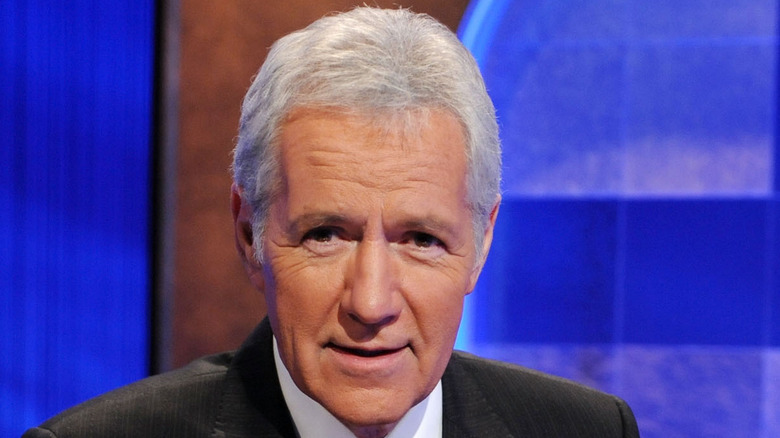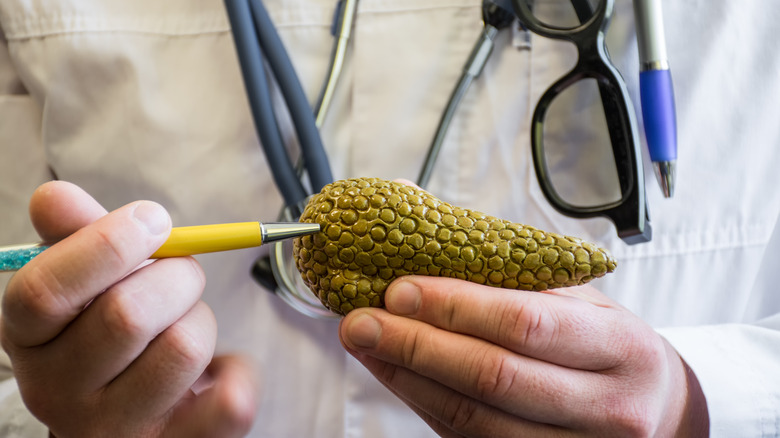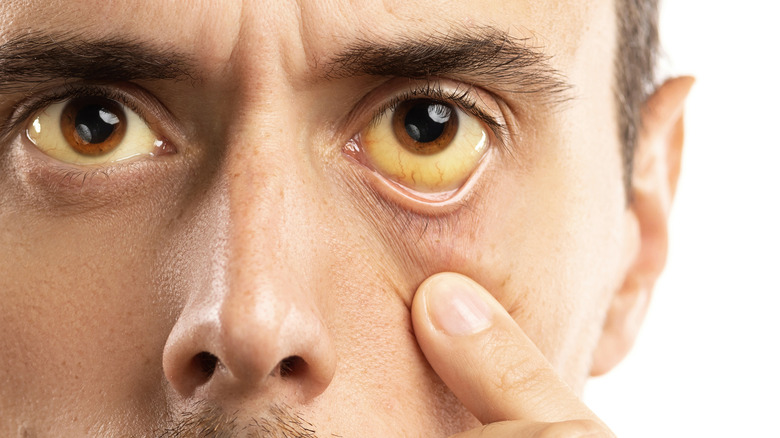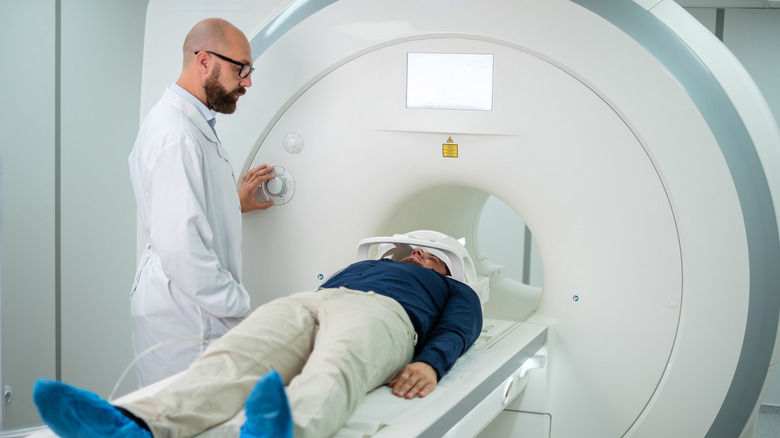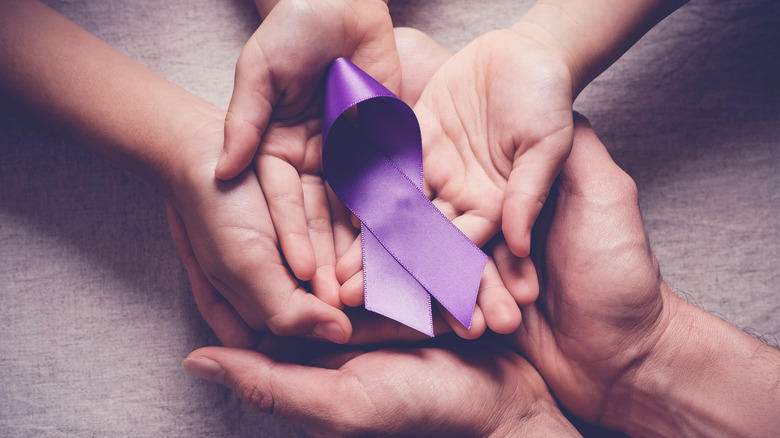Alex Trebek's Cause Of Death Explained
Television has changed a lot in the last few decades. Shows, channels, even whole broadcasting companies have come and gone. And that's to say nothing of changes in format, content, and timing. But there have been some constants. Certain faces, theme songs, and shows that people could go back to again and again when they needed something familiar. And for 37 years, Alex Trebek was one of those faces.
CNN reports that Trebek started his career in journalism before transitioning into the role of gameshow host. He was at it a few years before he was asked to host a revival of the show "Jeopardy." Along with "Wheel of Fortune" and "The Price is Right," "Jeopardy" would go on to define evening television through the 80s, 90s, and early 2000s.
Sadly, however, even the familiar must come to an end. For "Jeopardy," that end came on November 08, 2020. A tweet from the show's official account announced that Alex Trebek had died in his home, surrounded by family and friends. Though no cause of death was officially stated, it is widely believed that he died as a result of pancreatic cancer.
What is the pancreas?
In 2019 Trebek announced that he had been diagnosed with stage 4 pancreatic cancer (via CNN). Stage 4 diagnoses are generally quite serious, as it means the cancer has spread from the original source to other parts of the body (via Cancer.Net). With pancreatic cancer, the outlook is rarely optimistic. This is because, as the American Cancer Society explains, pancreatic cancer is very hard to catch early on. The pancreas is located deep in the abdomen, specifically behind the stomach, and it produces our digestive fluid and the hormones we use to process the sugars we eat (via the Mayo Clinic). So while this placement near the stomach makes it easy for the pancreas to do its job, it makes it hard for doctors to detect tumors when they're small. Complicating matters even further, the American Cancer Society explains that symptoms often don't show up until the cancer is fairly advanced. And even then, some patients don't experience symptoms at all until they're well in to Stage 4.
Symptoms and risk factors
With pancreatic cancer, symptoms may not show up until the cancer is in its later stages (via Mayo Clinic). Some symptoms are fairly generic and could be attributed to other conditions, including fatigue, appetite changes or unexplained weight loss, and itchy skin. But other symptoms are somewhat unique, and when they occur together, they tend to point to pancreatic issues. These include light stools and dark urine, abdominal pain that spreads to the back, blood clots, yellowing or jaundice of the skin and the whites of the eyes, and a new diabetes diagnosis or a standing diabetes issue that suddenly becomes much more difficult to control.
Many of these symptoms also tie into some of the risk factors for pancreatic cancer, which include a high body weight and a pre-existing diabetes diagnosis, according to the American Cancer Society. Other risk factors include aging — the average age of diagnosis is 70 — tobacco use, family history or genetic issues, and exposure to chemicals commonly used in dry cleaning and metal working.
Testing and diagnosis
Even if a patient is not showing symptoms, doctors may suspect pancreatic cancer or want to rule it out as a possibility. In these situations, the Mayo Clinic says there are several options they can use to secure — or rule out — a diagnosis. They range from non-invasive to procedures that patients may have to go under anesthesia for. The least invasive of these options are external body scans. These include CT scans, MRIs, and PET scans. External ultrasounds aren't generally as helpful because of where the pancreas is located. If a doctor wants to perform an ultrasound, they are more likely to order an endoscopic ultrasound. The National Pancreas Foundation describes the process as minimally invasive, though some doctors will put a patient under general anesthesia for its duration. This is to make it easier for the doctor to put a tube down the patient's throat to perform the ultrasound from inside the patient's body. The doctor may also take a biopsy at that time by passing a second tube down the endoscopic line to collect a tissue sample.
The Foundation says that a doctor may also perform a fine-needle aspiration, where they use a very fine needle to withdraw pancreatic cells. The Mayo Clinic states that doctors may also perform this test starting from outside the patient's body and going through the skin. They may also perform bloodwork looking for CA19-9 cells, which are given off by pancreatic cancer tumors.
Survival rates
Trebek announced his diagnosis in 2019 and received an outpouring of support from fans and colleagues alike (via CNN). His reassuring presence on television screens for nearly 40 years made him a dear feature in many households. His death shocked viewers and left many in mourning as the last episodes he recorded were aired in his memory.
For those familiar with pancreatic cancer, however, the short window between the announcement of Alex Trebek's diagnosis and his death is all too familiar. The disease's five-year survival rate is 39% in the best case, for patients whose cancer is still local to the pancreas, according to the American Cancer Society. Because the disease is hard to catch in its early stages, many patients do not receive a diagnosis until the cancer has spread. If it has only spread to organs and lymph nodes close to the pancreas, the five-year survival rate is 13%. Once the cancer spreads to the bones, blood, or distant organs, the five-year survival rate drops to 3%. It is an unfortunately aggressive disease affecting an estimated 60,000 people a year, with about 48,000 estimated to succumb from the disease in 2021.
Alex Trebek's legacy
Almost a year after his passing, Alex Trebek is still a fixture in American culture, one that has yet to be replaced on "Jeopardy." His steady presence, warm tone, and friendly smile add up to a one-in-a-million combination that guest hosts are striving to meet until a successor is named. Even after a full-time host is selected, it is unlikely anyone will match Trebek's legacy any time soon.
As Mike Richards, executive producer of "Jeopardy," told CNN in 2020, Trebek craved knowledge. He loved that his show made it cool to be intelligent and that it urged people to seek out knowledge with the same passion as its host. Alex Trebek had an urge toward compassion and toward helping others, even going so far as to use the announcement of his own cancer diagnosis to bring awareness to the rates of pancreatic cancer in America (via WebMD). It is a thoughtfulness and kindness of heart that will ensure his time hosting "Jeopardy" lives on not only as a highlight of evening television, but as a cultural influence many strive to continue.

